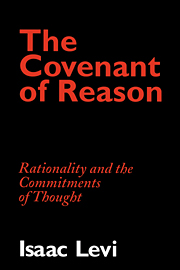Book contents
- Frontmatter
- Contents
- Introduction
- 1 Rationality and commitment
- 2 Rationality, prediction, and autonomous choice
- 3 The logic of full belief
- 4 Consequentialism and sequential choice
- 5 Prediction, deliberation, and correlated equilibrium
- 6 On indeterminate probabilities
- 7 Consensus as shared agreement and outcome of inquiry
- 8 Compromising Bayesianism: A plea for indeterminacy
- 9 Pareto unanimity and consensus
- 10 The paradoxes of Allais and Ellsberg
- 11 Conflict and inquiry
- 12 The ethics of controversy
- Name Index
- Subject Index
10 - The paradoxes of Allais and Ellsberg
Published online by Cambridge University Press: 05 June 2012
- Frontmatter
- Contents
- Introduction
- 1 Rationality and commitment
- 2 Rationality, prediction, and autonomous choice
- 3 The logic of full belief
- 4 Consequentialism and sequential choice
- 5 Prediction, deliberation, and correlated equilibrium
- 6 On indeterminate probabilities
- 7 Consensus as shared agreement and outcome of inquiry
- 8 Compromising Bayesianism: A plea for indeterminacy
- 9 Pareto unanimity and consensus
- 10 The paradoxes of Allais and Ellsberg
- 11 Conflict and inquiry
- 12 The ethics of controversy
- Name Index
- Subject Index
Summary
PRESCRIPTIVE AND DESCRIPTIVE ADEQUACY
In The Enterprise of Knowledge (Levi, 1980a), I proposed a general theory of rational choice which I intended as a characterization of a prescriptive theory of ideal rationality. A cardinal tenet of this theory is that assessments of expected value or expected utility in the Bayesian sense may not be representable by a numerical indicator or indeed induce an ordering of feasible options in a context of deliberation. My reasons for taking this position are related to my commitment to the inquiry-oriented approach to human knowledge and valuation favored by the American pragmatists, Charles Peirce and John Dewey. A feature of any acceptable view of inquiry ought to be that during an inquiry points under dispute ought to be kept in suspense pending resolution through inquiry. I contend that this sensible attitude ought to be applied to judgments of probability and value or utility. This consideration ought to lead to a form of indeterminacy in probability judgment, utility judgment and assessments of expected utility.
In Levi, 1980a, I did not examine the extent to which the proposals I made accommodate or fail to accommodate the results of empirical investigations exploring the rationality of probability judgment, utility judgment and decision making which have mushroomed in recent decades.
In this paper, I shall partially remedy this defect by examining the way the proposals under consideration address the so-called paradoxes of Allais and Ellsberg, the “preference reversal” phenomena uncovered by Grether and Plott, and responses to the Newcomb problem.
- Type
- Chapter
- Information
- The Covenant of ReasonRationality and the Commitments of Thought, pp. 185 - 216Publisher: Cambridge University PressPrint publication year: 1997



